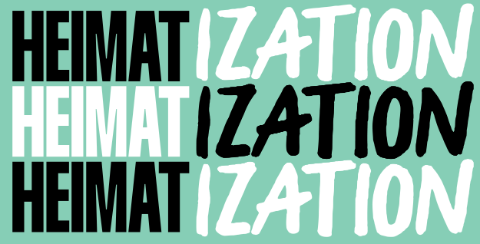Celebrating Contemporary Black Movements in Germany
40 Years of Resistance, Empowerment, and Shaping the Future
Conversation
12:30–23:00
40 Years of Initiative Schwarze Menschen in Deutschland: Self-organising and Resistance
Performances, Readings, Conversations, Music
19:00–21:00
Heimatization
Conversation
Fri., 24.10.2025
19:00
Safi Faye Hall
In German, simultaneous translation into English and German Sign Language (DGS)

For centuries, Black people have shaped Germany’s history—politically, poetically, scientifically, and in many other areas. From the polemical writings of Anton Wilhelm Amos in the first half of the eighteenth century, to the petition for equality and independence by Martin Dibobe and his colleagues in 1919, to the artistic interventions of Louis Brody in the 1930s, Dualla Misipo’s literary voice in Der Junge aus Duala [The boy from Duala], and the powerful poems of May Ayim. Black perspectives have shaped and changed Germany. But all too often they have remained invisible or marginalized—and have even been deliberately ignored.
Now, forty years after the founding of the Initiative Schwarze Menschen in Deutschland (ISD, Initiative of Black People in Germany), numerous figures are looking back, reminiscing, and celebrating. But this anniversary is not just a moment of reflection; even more than this, it’s an invitation to collectively think ahead: How can the future of Blackness be articulated politically? How can local struggles be anchored in a global context? What bridges lead from the present realities of Black life in Germany to the future of Black communities more broadly?
Friends, founders, and companions gather at Haus der Kulturen der Welt (HKW) to celebrate the anniversary, including ADEFRA e. V.—Black Women in Germany, Each One Teach One, the Central Council of the African Community in Germany, and numerous other initiatives and networks. They share memories, experiences, and visions, unpacking the social climate at the time the ISD was founded, challenges and successes, what it meant to be ‘German’ at the time, and what has changed since then.
Further emphasizing that this anniversary is not just about looking at the past, the event also showcases the young, self-organized initiatives from democratic civil society that are raising their voices today. Then as now, the aim is to give visibility to Black perspectives in all their diversity, to strengthen alliances, and to open up new avenues of solidarity—together with the disability rights movement, refugee organizations, and queer, Jewish, and numerous other communities.